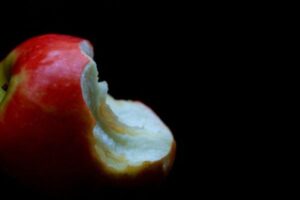Can Health Food Be Addictive? Orthorexia Nervosa’s Risks

We think of addiction in the most basic terms: Obsession. Vice. Bad for You. And most of the time it’s true. Drugs, cigarettes, caffeine, alcohol—the most common substances we associate with addiction—have a history of mostly negative effects on the body. But it doesn’t stop there. Recent research has linked processed foods—particularly those high in trans fats—to also having addictive properties. But of course, things aren’t so basic. Can brown rice be addictive? What about carrots? An apple? And if so, is that really a bad thing?
Addiction is defined as a physical and/or psychological dependence on a (usually) psychoactive substance like cocaine, heroin or tobacco, despite the negative cost of continued use. Although there was most likely once a feeling of enjoyment or pleasure, as the addiction become stronger, the substance only provides a feeling of “normal” and no longer offers its dependent much pleasure.
Eating disorders have plagued the Western world for decades—both over- and under- eating—while having two vastly different negative effects on the body, cause a similarly distorted mental relationship with food. That is, the sufferer loathes its effects. The morbidly obese claims he or she can’t stop eating foods they know are bad for them, while the anorexic or bulimic is so frightened of foods effects on their body image, they’ll go to life-threatening lengths to avoid or evacuate binges of it from the body.
So where does a health food addiction come into the picture? Isn’t healthy food always good for us? According to Dr. Steve Bratman, author of the book “Health Food Junkies” who coined the term for the condition orthorexia in the late 1990s (and claims he also suffered from it), “orthorexia seems to have elements of OCD [obsessive compulsive disorder]. It may also have elements of standard anorexia. But it is often not very much like typical OCD or typical anorexia.”
In a 2004 study titled, “Orthorexia nervosa: a preliminary study with a proposal for diagnosis and an attempt to measure the dimension of the phenomenon,” Italian researchers at the University of Rome concluded that “The orthorexic subjects attribute characteristics that show their specific “feelings” towards food (“dangerous” to describe a conserved product, “artificial” for industrially produced products, “healthy” for biological produce) and demonstrate a strong or uncontrollable desire to eat when feeling nervous, excited, happy or guilty.”
The diagnosis of orthorexia (“ortho” means “right” or “correct”) was not recognized as an eating disorder for nearly a decade, and even today, its implication is regularly challenged. We are after all, a nation suffering from serious lapses in healthy eating; children under age four are developing diabetes and becoming severely obese along with their parents. It would seem that no amount of healthy eating could ever be too much. But we are also a species prone to complicated answers.
Perhaps you know (or are) a fitness-obsessed person. The I-go-for-a-morning-jog-in-a-winter-blizzard-or-die-trying kind. It’s the addiction-overrides-logic (shoveling all the snow will be a serious work out in and of itself) behavior that separates the healthy from the addicted. While on the surface, the uber-athlete may seem more disciplined and regimented than those of us who require (or get by with) far less physical activity, but the addict obsesses, needs the adrenaline rush from a workout and penalizes himself when it’s not achieved by stressing and often doubling up at the next exercise opportunity.
Similarly, according to the Eating Disorders Help Guide, “A person with orthorexia will spend just as much time and energy thinking about food as someone with bulimia or anorexia. They may not think about calories, but they think about the overall “health benefits”; how the food was processed, prepared, etc.” And likewise, when something “unpure” slips into their mouth, the subject can obsess over eliminating it from the body much like a bulimic needing to purge. The obsession and fixation has led scientists and physicians to shift their opinion in recent years, now acknowledging the prevalence of the disorder as separate from other eating or obsessive-compulsive disorders.
While not nearly as life-threatening as anorexia or bulimia, the fixation with a perceived “pure” state believed to be achieved by obsessively regulating the quality of food, orthorexia is now seen as a possible “gateway diet” to the more serious eating disorders or the development of other obsessive-compulsive behaviors. Like the anorexic, the orthorexic tends to be overly self-critical, obsessed with body image, fixated on the foods, and one of the greatest challenge: a denial that the behavior is in and of itself, ironically, unhealthy.
But what about the rest of us?
Avoiding toxic pesticides, preservatives and harmful genetically modified foods is a legitimate lifestyle choice. There are many known risks to consuming pesticides, BPA and artificial sweeteners like aspartame, for example. And, we are indeed a nation obsessively over-eating, especially processed junk food. So making conscientious choices for yourself and your family have maybe never been more important. Know the difference between reading labels to avoid high fructose corn syrup and avoiding certain foods with a militant stringency; cooking at home because it’s economical and healthy versus eating specific foods prepared in a certain way; inspecting the appearance of ingredients (like fresh or clean) versus seeking out the perceived “healthiest” option. And always consult with a physician if you feel you may have any kind of eating disorder.
Keep in touch with Jill on Twitter @jillettinger
Sources
http://www.ncbi.nlm.nih.gov/pubmed/15330084
http://www.eatingdisordershelpguide.com/orthorexia.html
Image: Pink Sherbet Photography

